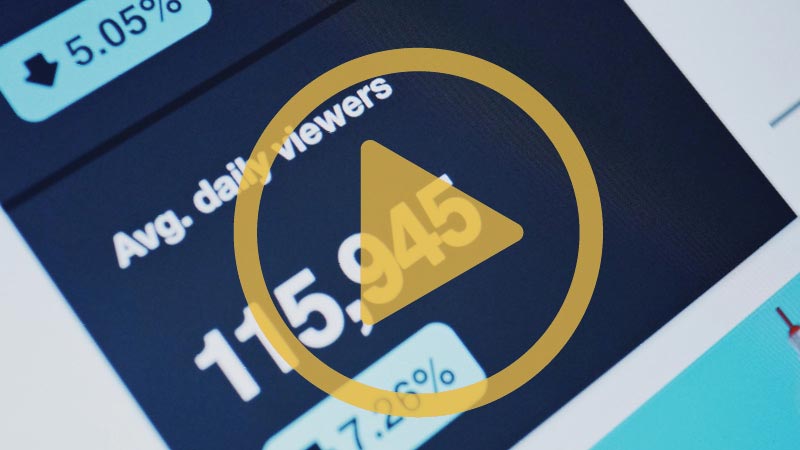GOOGLE RANKING FACTORS FROM THE SEO COMMUNITY
Every year, Rand Fishkin conducts a survey of professionals in the Search Engine Optimization (SEO) industry to determine the community’s take on the top Google ranking factors in Google’s algorithm. In 2019, there were 1,584 SEOs who responded to a series of questions asking them to rank the factors on a scale of zero to 10, with zero being “Not Used” and 10 being “Very Heavily Weighted.”
If you are interested in reading the full results (it’s easy to follow along and has great insights), you can find the results on SparkToro.
THE QUESTIONS, RESULTS, & WHAT IT MEANS
The survey asked a series of questions to determine the skill level of respondents, how the algorithm approaches the weighting of ranking factors and which factors are thought to carry more weight in rankings than others.
For Google’s organic web rankings (non-paid, ten-blue-links style listings), which of the following statements is closest to how you think the system functions?

Interestingly, about 2/3rds of SEOs (66.3%) polled believe that Google ranking factors vary widely based on the search query. There was a small amount (7.36%) that believe that the factors are always weighted the same regardless of the search query.
WHAT IT MEANS
I completely agree here. I think Google is looking at queries that are informational under a different light than queries that are transactional. If the searcher is looking for information on a topic, then the content on the page should carry more weight than the technical aspects like meta data or page speed. When the searcher is looking to buy an item, then having proper meta data, strong mobile page scores, and using the exact match keyword should carry more weight than how many links are driving to that page or the words on the page as a whole.
For each of the following factors, enter your opinion of how much weight it receives in Google’s organic ranking systems (the classic, ten-blue-links style results).
- Accuracy of the content (i.e. whether, from Google’s perspective, the page’s/site’s content is truthful and correct)
- Age of the website/domain
- Anchor text of links pointing to other pages on the host domain
- Anchor text of links pointing to the specific ranking page
- Exact (or near-exact) use of the searched-for keywords in the content, title and metadata of the page
- Freshness/recency of the content’s publication
- Google’s perceived expertise, authority and trust of the host domain
- Google’s perceived expertise, authority and trust of the individual page’s content (and, if identifiable, the author behind it)
- Keyword use in the Host Domain Name
- Keyword use in the URL
- Link authority of the host domain (based on the quantity and quality of the links that point to the entire website)
- Mentions of the host domain or its associated brand in content around the web (aka “unlinked mentions”)
- Mobile-friendliness of the UI/UX
- Presence of external links in the page’s content (i.e. linking out to other websites)
- Quality of the websites and pages linking to the page
- Quantity/diversity of the websites linking to the page (i.e. more unique linking domains vs. many links from the same sites)
- Relevance of the page’s content to the query (i.e. is the text topically relevant to the searched-for keywords)
- Site accessibility factors (like use of alt text on images, screen-reader friendliness, use of color, design of online forms, header us, resizable text, etc.)
- The location, frequency, and distance of words and phrases closely related to the searcher’s query in the text of the page’s content
- Total amount of content on the page
- Use of entities relevant to the query (like names, concepts, places, etc.) in the page’s content
- Use of Google’s AMP web component framework
- Use of unique images/visuals relevant to the query
- Use of words, phrases and content Google might deem “highly relevant to” or “crucial to answering” the query (apart from the query term itself)
- User & usage data signals such as searchers’ click-preferences, bounce rate relative to other pages/sites in the rankings, pogo-sticking, engagement, etc.
- Web page load speed

One of the more interesting aspects of the results is seeing how SEOs that self-identified as being in the Top 10% of the field responded compared to all respondents. To me, the Top 10% likely provide a truer view of how the ranking factors are considered in queries because of their collective expertise and experience. Their order isn’t that far off from the overall respondents’ results, but it does vary slightly in the top 5 and largely in the bottom half.
TOP 5 GOOGLE RANKING FACTORS
- Relevance of overall page content
- Quality of linking sites & pages
- Use of query-relevant words & phrases
- Domain’s perceived expertise, authority & trust
- Mobile friendliness
WHAT IT MEANS
My takeaway from the top 5 ranking factors is that we are seeing the effects of a couple of different movements that Google has been pushing over the past couple years—E-A-T and mobile-first indexing. E-A-T stands for “Expertise, Authority, Trust” and highlights Google’s approach for determining the quality of a page and the page’s ability to solve the needs of the searcher’s query.
How much of an impact do you believe the following trends will have on SEO in the next 3 years?
- Advancements in machine learning and artificial intelligence
- Changes to the quantity and presentation of ads in Google’s search results
- Google Discover and other latent, content-nudging/engagement technologies
- Google entering more verticals and competing directly with publishers in their results (e.g. Google Flights, Hotels, Jobs, Events, Maps, Play, Books, etc.)
- Government intervention in Google’s operations from Congressional investigations, Justice Department actions, plans like Bernie Sanders’ or Elizabeth Warren’s to break up Google, or other anti-monopoly activity
- Government intervention in the technology and web landscape (e.g. EU’s GDPR, Articles 11+13, US Justice Dept. investigation into Google’s antitrust behavior, etc.)
- Loss of cookie, visit and web tracking data (from privacy-focused changes from browsers, tech company changes, and govt. requirements)
- Visual search advances like Google Lens, photo-based querying or other image-search technology leaps
- Voice search as a query input (i.e. a searcher speaks their search to a mobile or desktop device instead of typing it)
- Voice-answered queries like those offered by Google’s Assistant, Alexa, Siri, etc. (i.e. a searcher receives a spoken-voice answer without a screen of results)
- Zero-Click searches on Google (queries that result in no traffic to the sites that appear on the SERP)

TOP 5 TRENDS WITH THE BIGGEST IMPACT ON SEO IN NEXT 3 YEARS
- Google entering verticals/competing directly vs. publishers
- Advancements in machine learning/artificial intelligence
- Zero-Click searches on Google
- Changes to quantity/presentation of Google Search Ads
- Loss of cookie, visit & web tracking data
WHAT IT MEANS
I could not agree more with these top trends to watch. Each one of these has been growing over the past year or so and SEOs are seeing the impacts of them on organic traffic.
Google’s growth of things like Knowledge Graph has led to a decrease in the amount of organic traffic on searches with informational intent such as “cast of Top Gun.” In the past, that query would return the standard ten-blue-links organic results and searchers would click through to a site like IMDB. Now, this SERP returns those same ten-blue-links but also shows the entire cast in a scrollable banner in position 0 (above the first organic link) as well as information about the movie on the right-hand column and links after the list of ten-blue-links that take you to movies also directed by Tony Scott, movies starring Tom Cruise or movies about pilots. Each one of these links keeps you within Google’s walled garden rather than sending you to an external site. In total, there are 71 different links to pages that are part of the Google ecosystem!
The same reduction in traffic is occurring as more and more queries result in Zero-Click searches, where Google simply provides the answer to the query in a featured snippet or even in the auto-suggest options of the search box itself.
TLDR
- 1,584 responses were collected
- 2/3 of SEOs think ranking factor weights vary widely depending on the query
- 26 factors were ranked in total
- Top 5 factors (1 – 5)
- Relevance of overall page content
- Quality of linking sites & pages
- Use of query-relevant words & phrases
- Domain’s perceived expertise, authority & trust
- Mobile-friendliness
- Bottom 5 factors (22 – 26)
- “Unlinked mentions” of the site/brand
- Age of the website
- Use of Google AMP
- Use of external links on the page
- Keyword in the Domain Name
- Top 5 trends to watch over the next 3 years (1 – 5)
- Google entering verticals/competing directly vs publishers
- Advancements in machine learning/artificial intelligence
- Zero-Click searches on Google
- Changes to quantity/presentation of Google Search Ads
- Loss of cookie, visit & web tracking data
- For the 1st time of this survey, content beat out links & keywords



